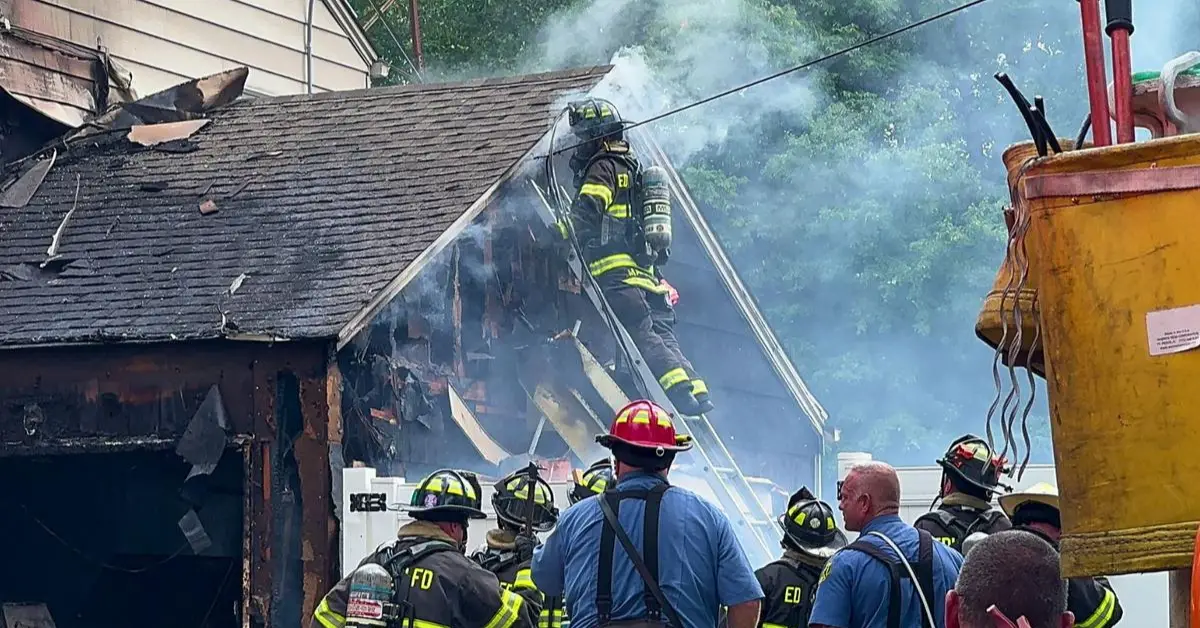A recent fire in a New Jersey home has raised alarms about the safety risks associated with lithium-ion batteries. The blaze, which occurred in the early hours of the morning, is suspected to have been caused by a lithium battery, highlighting growing concerns about the dangers of these rechargeable power sources.
According to the local fire department, the fire started in a residential neighborhood where the house was engulfed in flames. The authorities quickly determined that the fire’s origin was linked to a lithium-ion battery, commonly used in everyday gadgets like smartphones, laptops, and electric scooters. These batteries have been at the center of multiple fire-related incidents over the years, with experts warning that they can overheat or explode if not properly handled or stored.
Firefighters were able to contain the fire before it spread to neighboring homes, but the damage to the house was significant. Fortunately, the family living in the house managed to escape without injury, although they have been temporarily displaced due to the extensive damage.
Experts believe that the incident could have been prevented if certain precautions had been taken when charging the battery. Lithium-ion batteries are known for their high energy density, making them powerful and efficient. However, they can be volatile if exposed to high temperatures, charged improperly, or subjected to physical damage.
One common issue with these batteries is overcharging. When a lithium battery is left plugged in for too long, it can cause the battery to overheat, potentially leading to a fire. Another risk factor is using faulty chargers, which can increase the risk of short-circuiting the battery or causing it to overheat. Experts also emphasize the importance of only using certified chargers that are compatible with the specific device being charged.
Another factor that can contribute to lithium battery fires is physical damage. If a battery is dropped or punctured, it can lead to a short circuit, which may ignite a fire. This risk is particularly high for devices like electric scooters or hoverboards, which are often subjected to wear and tear during use. In fact, reports of hoverboard fires have made headlines in recent years, with many incidents linked to faulty batteries.
To prevent such fires, safety experts recommend storing lithium-ion batteries in cool, dry places and avoiding charging them overnight or when you are not home. It’s also crucial to inspect devices regularly for any signs of wear or damage to the battery, such as swelling, leaks, or discoloration. If any of these issues are detected, it’s important to stop using the device and replace the battery immediately.
In addition to personal safety, there are also environmental concerns related to the disposal of lithium batteries. When these batteries are disposed of improperly, they can pose a significant hazard to both humans and wildlife. For example, improperly discarded batteries can leak harmful chemicals into the environment, and they can even cause fires if they come into contact with other materials. As a result, proper disposal of lithium-ion batteries is essential to prevent further accidents.
Authorities have urged the public to take extra precautions when charging or handling lithium-ion batteries. They also stress the importance of reporting any incidents of battery-related fires to local fire departments to help track the frequency and causes of such incidents. By raising awareness about the risks and promoting safer practices, experts hope to reduce the number of fires caused by these batteries.
The incident in New Jersey serves as a stark reminder of the potential dangers associated with lithium-ion batteries. While these batteries are integral to modern life, it’s important to handle them with care to avoid accidents and ensure the safety of your home and family. By following proper charging practices and disposing of old batteries responsibly, you can help mitigate the risks and prevent future incidents.
With the rise in popularity of electric vehicles, smart devices, and personal electronics, it’s crucial for consumers to stay informed about the risks and take proactive measures to protect themselves. By following safety guidelines, you can continue to enjoy the benefits of lithium-ion batteries without compromising your safety or the safety of others.
In response to the growing number of incidents, some manufacturers have begun introducing enhanced safety features in their devices, such as thermal protection circuits and overcharge protection. However, these innovations alone cannot guarantee complete safety. It remains up to consumers to take responsibility for safe battery use and storage to minimize the risk of fire.
In conclusion, the New Jersey house fire caused by a lithium-ion battery is a stark reminder of the potential dangers these devices pose. With proper care and attention, it is possible to use lithium-ion batteries safely, but neglecting basic safety practices can lead to serious consequences. Whether it’s taking the time to inspect your devices, using the correct chargers, or disposing of batteries properly, simple precautions can go a long way in preventing accidents and protecting your home.




